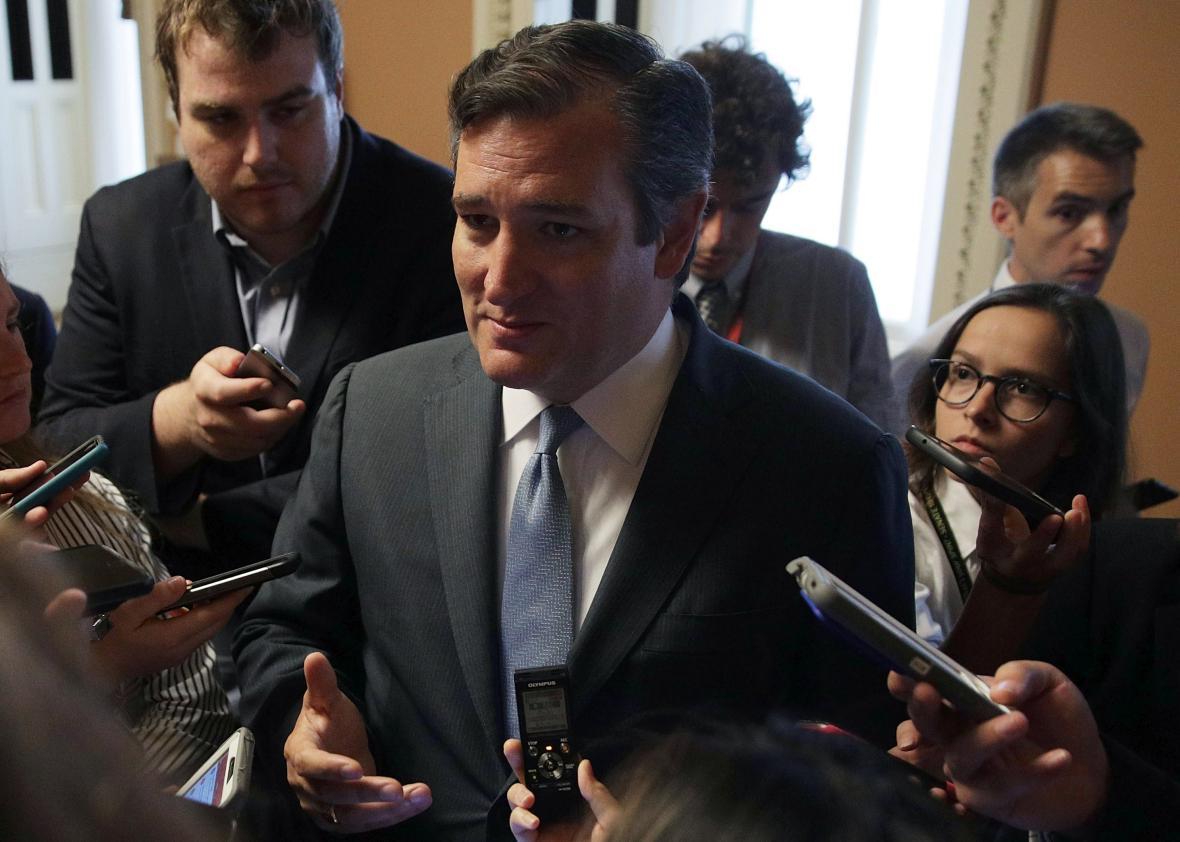One of the first things that virtually every health policy expert noticed about the latest version of the Senate health care bill was that it would effectively shunt Americans with pre-existing conditions into their own separate insurance market, where they could potentially face sky-high premiums. This was thanks to a provision negotiated by Texas Sen. Ted Cruz, who demanded it in return for his support.
Cruz, of course, claims his amendment would do no such thing. He has reportedly told his moderate GOP colleagues, whom he is now trying to cajole into voting for this monstrously unpopular legislation, that the sick will be protected under his system—that there shall be no shunting. As Republicans try to push their bill closer to passage next week, it would not be surprising to hear some conservatives echo his talking points.
Those talking points are pure bunk. Flimflam. Sleight of hand, if I’m being generous. Here is why.
As I wrote Thursday, the Cruz amendment would allow insurance companies to sell unregulated, low-cost coverage plans that could be priced based on customers’ health as long as they also offered plans that complied with all of Obamacare’s rules and requirements—such as the ban on charging more to customers with pre-existing conditions. This approach would lead to an obvious outcome: Young, healthy Americans would stick to the unregulated market, where they could be charged less for being young and healthy. Meanwhile, those in worse health would purchase the Obamacare-compliant plans, which (since they’d be catering almost entirely to the sick) would surge in price. That coverage could be unaffordable for middle-class families on the individual market who earn a bit too much to receive subsidies.
Cruz says there’s nothing to fear. Why not? Technically, his amendment would keep all regulated and unregulated plans as part of a single risk pool. “Ted Cruz emphatically told fellow Republicans Thursday that his amendment to the Senate’s Obamacare repeal legislation would not split up healthy and sick people into two different risk pools, eliminating concern that an earlier version of his plan would drive up costs for sick people,” Politico reported Thursday.
This is deeply deceptive. A risk pool is the group of customers whose health costs insurers average together to determine premiums (to Aetna and Blue Cross Blue Shield, each of us is just another risk). If the pool is made up of twentysomethigs with few health care needs, then premiums are going to be low. If the pool is full of older patients with cancer and failing knees and hips, then premiums are going to be very high.
Under Obamacare, insurers are required to lump all their customers within a state into one giant risk pool where everyone’s expenses are averaged out to set what’s known as a basic “index rate” for health premiums. And because carriers aren’t allowed to charge sick people more than the healthy, the result is that Americans pay the same for insurance on the individual market whether they have a heart condition, need a wheelchair, or are a yoga-practicing raw-food fanatic who hasn’t seen the inside of a doctor’s office in three years. (Premiums can increase by age or county, however.)
Technically, the Cruz amendment would leave the rule about the single risk pool in place. But it wouldn’t matter much, since insurers would also be allowed to charge different prices based on health.
“When you charge people different premiums based on health, you may nominally create a single risk pool, but you immediately blow it up,” Larry Levitt of the Kaiser Family Foundation told me. In other words, under the Cruz plan, it would be one risk pool in name only. (There are also some technical aspects of the bill that really drive this point home. For instance, the process known as “risk adjustment”—where the government redistributes money from insurers that enroll disproportionately healthy customers to those that get unlucky and enroll a bunch of sick folks—only applies to the Obamacare-compliant plans. So it really is a separate market.)
The insurance industry agrees with the skeptical reading of Cruz’s measure. In a policy brief Friday, the American Academy of Actuaries effectively called out Cruz’s sleight of hand. “Rather than having a single risk pool, in which costs are spread broadly, there would be in effect two risk pools—one for ACA-compliant coverage and one for noncompliant coverage,” it explained. “As a result, average premiums for ACA-compliant coverage could far exceed those of noncompliant coverage, thereby destabilizing the market for compliant coverage.” Notably, insurers and their trade group have also slammed the Cruz amendment as unworkable. There seems to be a consensus among health care wonks and professionals that this thing is a shabby, potentially dangerous parlor trick of a policy.
For what it’s worth, some libertarians who would like to eliminate all of Obamcare’s regulations are apparently worried that Cruz’s “single risk pool” will lead healthy Americans to pay more. Cato’s Michael Cannon, for instance, argues that the setup will require insurers to increase prices on both regulated and unregulated plans by the same percentage each year. “In other words, secure, long-term, guaranteed-renewable coverage would be impossible, because the ‘single risk pool’ price controls would tax those plans to death,” he writes. But while that might be nominally true, nothing would stop insurers from creating new, dirt-cheap insurance plans in the unregulated market that resemble their customers’ old plans each year to avoid price hikes. Which sounds great if you’re in good shape, but is ultimately a function of a system in which the healthy are no longer helping balance out the costs of the sick—who then end up paying through the nose.
The “single risk pool” that Cruz is touting is window dressing, a bit of bunting to improve the curb appeal of a decrepit piece of legislation. Don’t buy it.
